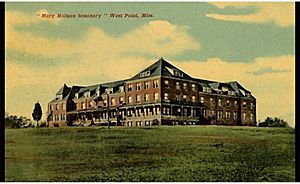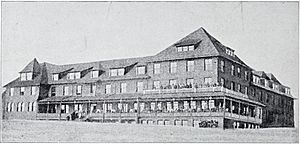Mary Holmes College facts for kids
 |
|
| Motto | Not to Seem, But to Be |
|---|---|
| Type | HBCU |
| Active | 1892–2005 |
| Affiliation | Presbyterian Church (United States) |
| Location |
West Point
,
,
|
| Colors | purple and white |
| Mascot | eagle |
Mary Holmes College was a special school in Mississippi, USA. It was created to help young Black women get an education. The school was started by the Presbyterian Church. Later, it became a college for both boys and girls. It helped many students get ready for jobs and further studies.
Contents
The Story of Mary Holmes College
Mary Holmes College started as Mary Holmes Seminary in Jackson, Mississippi. It was founded in 1892. A Presbyterian missionary, Reverend Mead Holmes, and his daughter, Mary Emilie Holmes, had the idea. They wanted to honor Rev. Holmes's late wife, Mary D. Holmes.
Early Days and Goals
The school's first goal was to train young Black women. They learned skills for homemaking and leadership. They also learned how to be leaders in their communities and the Presbyterian Church. The school was funded by the Presbyterian Church's Board of Missions for Freedmen.
When it first opened, 90 girls attended. They came from all over Mississippi. The teachers were white. Students ranged from primary school to high school age.
What Students Learned
The early lessons focused on three main areas:
- Literary (reading, writing, history)
- Music
- Industrial (practical skills)
Students took classes in literature, grammar, history, science, and math. They also studied the Bible. Practical skills like cooking and sewing were taught too.
Moving and Rebuilding
The first school building in Jackson was built on land donated by local Black citizens. Sadly, it burned down in January 1895. This was less than three years after it opened.
The school reopened at a new campus in West Point, Mississippi. This new site was on 20 acres of donated land. But in March 1899, another big fire destroyed it. The school was rebuilt on the same spot and opened again in January 1900.
Changes Over the Years
In 1932, Mary Holmes Seminary became a college for both boys and girls. It changed its focus to training elementary school teachers. This was a common change for many Black colleges in the South at that time.
By 1959, the state started taking more responsibility for public schools. So, Mary Holmes College changed again. It became a two-year community college. It was renamed Mary Holmes Junior College. It welcomed all students, even those without high grades.
In 1969, the college became independent. It was no longer directly managed by the Presbyterian Church. The word 'Junior' was removed from its name.
A Place of History
In 1991, the main buildings of the West Point campus were recognized as important. They were added to the National Register of Historic Places. This was because the college was a major place for Black students' education. It served the Clay County area from its founding until schools became desegregated in the 1960s.
Seven buildings were included in this historic district. They were between 50 and 90 years old. These included the Main Hall, the Farmhouse, North Hall, the Pavilion, and the Barr Library.
Challenges and Closure
From the 1970s onward, Mary Holmes College focused on helping students who faced economic challenges. Many students came from the southeastern United States. The college worked with four-year universities. This helped its graduates continue their education and earn a bachelor's degree.
However, the college faced difficulties. It struggled to attract enough students and get enough money. In the mid-1990s, it had fewer than 800 students. In 2002, it lost its official accreditation. This meant its degrees were no longer recognized by some institutions.
Mary Holmes College closed its doors in March 2005. The property, which had grown to 184 acres, and the school's historical records went back to the Presbyterian Church. In 2010, a historical marker was approved for the college.
New Life for the Campus
Also in 2010, the church sold the campus. It had 25 buildings. A group called Community Counseling Services bought it. This group helps people with mental health and addiction.
They have fixed up many buildings, including the chapel. They also plan to turn one building into a small museum. This museum will honor the college's history. It will also be a place for former students to have reunions.
 | Aurelia Browder |
 | Nannie Helen Burroughs |
 | Michelle Alexander |


